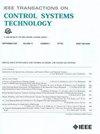具有时滞的异构队列协同自适应巡航控制:控制器设计与实验
IF 4.9
2区 计算机科学
Q1 AUTOMATION & CONTROL SYSTEMS
引用次数: 0
摘要
协作式自适应巡航控制(CACC)具有提高道路吞吐量和安全性的潜力。为了在高速公路上实现CACC的全面部署,控制器应该能够处理车辆串中的异构性。此外,在这种情况下,驱动延迟已被证明对控制器的性能有害。在本文中,我们提出了一个异构队列的控制器设计,其中自我车辆在传动系统中经历了驱动延迟。所提出的控制器不需要前车的传动系统信息,产生了一种适用于异构队列的控制方法。此外,没有对整个排的延迟顺序施加约束。推导了具有时滞的闭环系统的输入-状态稳定性条件,并在考虑驱动和通信时滞的情况下分析了系统的弦稳定性特性。用两辆车组成的队列对所提出的控制器进行了实验验证。本文章由计算机程序翻译,如有差异,请以英文原文为准。
Cooperative Adaptive Cruise Control for Heterogeneous Platoons With Delays: Controller Design and Experiments
Cooperative adaptive cruise control (CACC) has the potential to increase road throughput and safety. To achieve full deployment of CACC on highways, controllers should be able to deal with heterogeneities in the vehicle string. Moreover, actuation delays have shown to be detrimental to the performance of controllers in such settings. In this article, we present a controller design for heterogeneous platoons, where the ego vehicle experiences an actuation delay in the driveline. The proposed controller does not require driveline information of the preceding vehicle, yielding a control approach suitable for heterogeneous platoons. Moreover, no constraints are imposed on the ordering of the delays throughout the platoon. We derive input-to-state stability conditions for the closed-loop system with delay and analyze the string stability properties of the system, taking into account both actuation and communication delay. The proposed controller is experimentally validated with a platoon consisting of two vehicles.
求助全文
通过发布文献求助,成功后即可免费获取论文全文。
去求助
来源期刊

IEEE Transactions on Control Systems Technology
工程技术-工程:电子与电气
CiteScore
10.70
自引率
2.10%
发文量
218
审稿时长
6.7 months
期刊介绍:
The IEEE Transactions on Control Systems Technology publishes high quality technical papers on technological advances in control engineering. The word technology is from the Greek technologia. The modern meaning is a scientific method to achieve a practical purpose. Control Systems Technology includes all aspects of control engineering needed to implement practical control systems, from analysis and design, through simulation and hardware. A primary purpose of the IEEE Transactions on Control Systems Technology is to have an archival publication which will bridge the gap between theory and practice. Papers are published in the IEEE Transactions on Control System Technology which disclose significant new knowledge, exploratory developments, or practical applications in all aspects of technology needed to implement control systems, from analysis and design through simulation, and hardware.
 求助内容:
求助内容: 应助结果提醒方式:
应助结果提醒方式:


